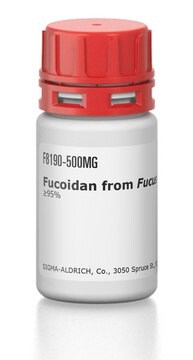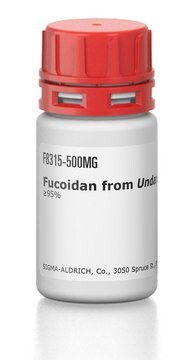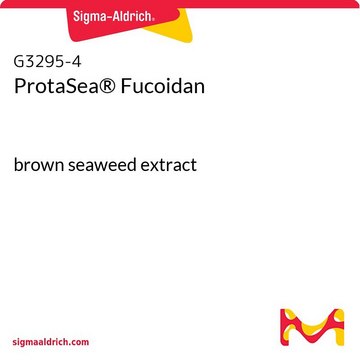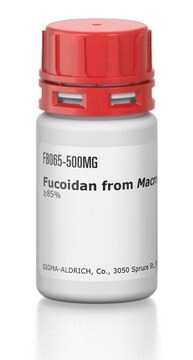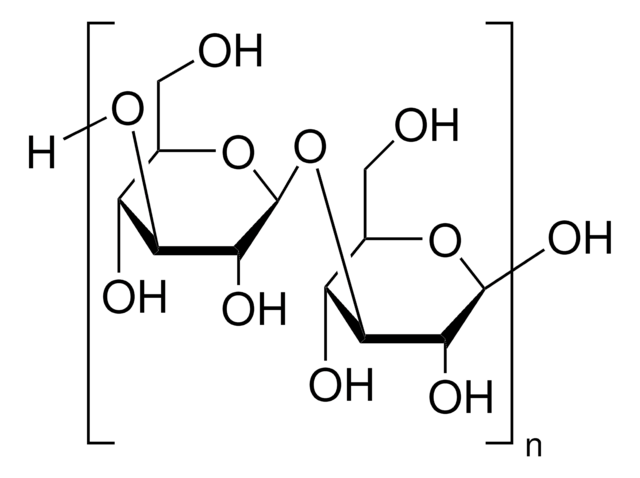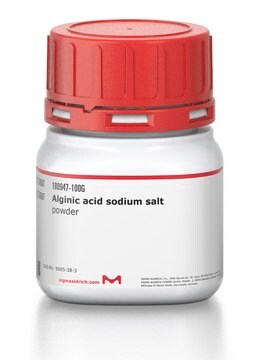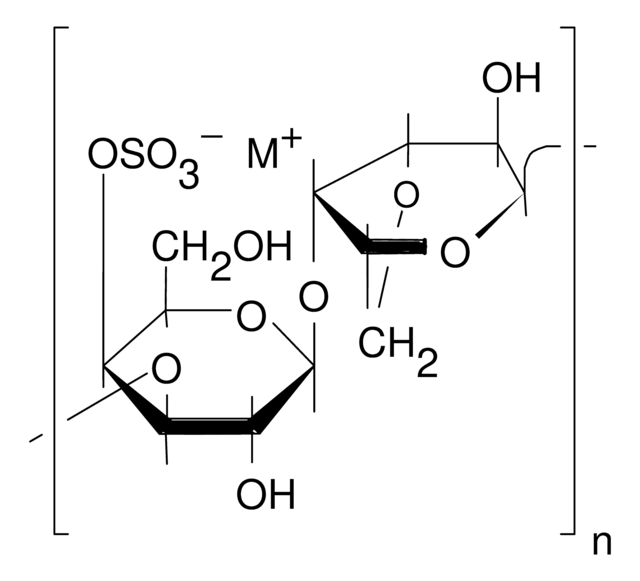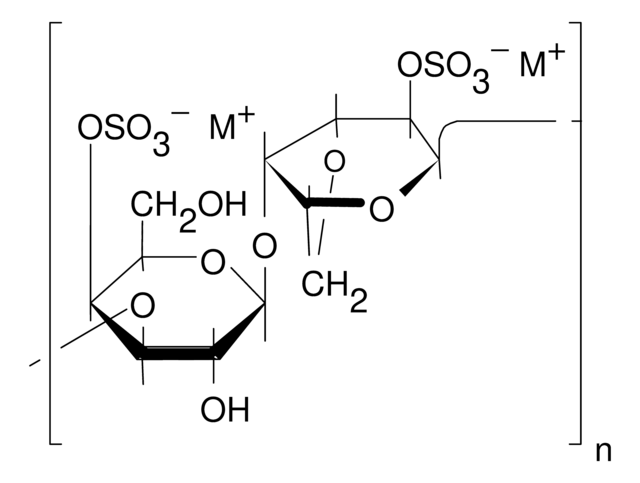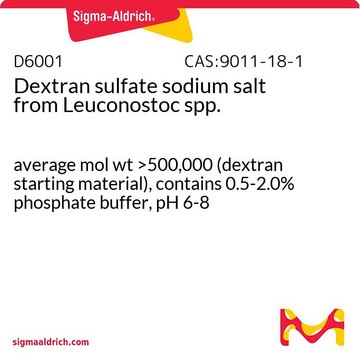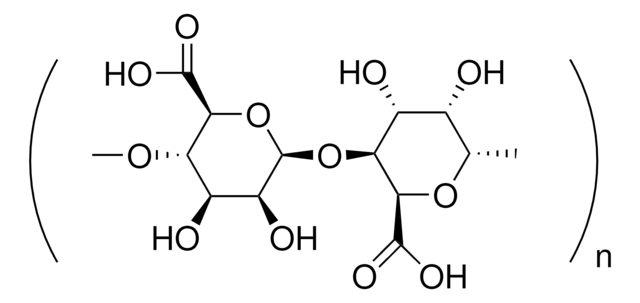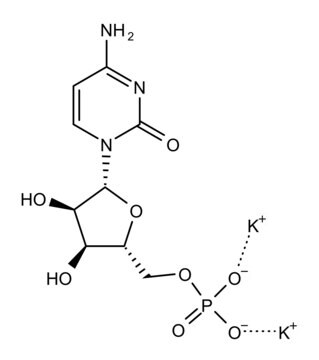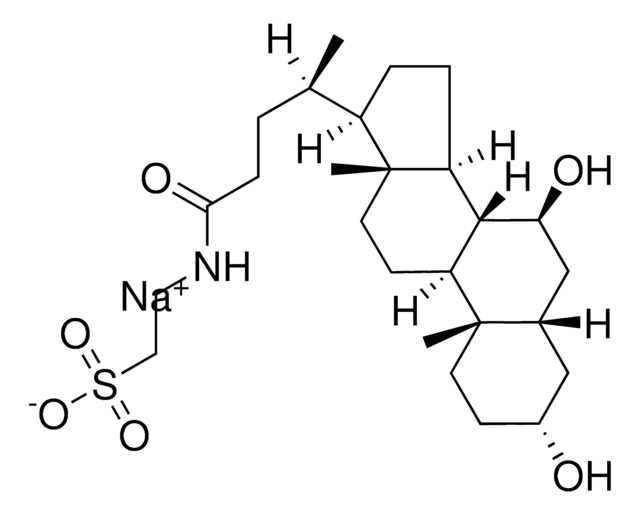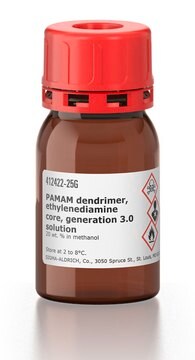F5631
Fucoidan from Fucus vesiculosus
Crude
Synonym(s):
Fucoidin
Sign Into View Organizational & Contract Pricing
All Photos(2)
About This Item
Recommended Products
biological source
algae (Fucus Vesiculosus)
Quality Level
form
powder
quality
Crude
color
light yellow to brown
solubility
H2O: 10 mg/mL, clear to hazy, faintly yellow to brownish-yellow
cation traces
Ca: ≤1%
Na: ≤ 8% (ICP)
storage temp.
room temp
Looking for similar products? Visit Product Comparison Guide
General description
Fucoidan is a fucose-rich, sulfated polysaccharide isolated from several species of brown seaweed.
Application
Fucoidan from Fucus vesiculosus may be used as a biological response modifier and as a potential therapeutic agent with a wide range of biological activities. It may be used to study its pharmacokinetics, safety, efficacy and methods of delivery as a potential anticancer, anti-immune and anti-inflammatory agent. Fucoidan may be used to assess its potential and formulations for tissue engineering applications.
Biochem/physiol Actions
Studies of fucoidan have found it to have a broad variety of biological activities including antitumor and antiangogenic activities, immunomodulatory, anti-inflammatory, anticoagulant, antithrombotic, and antioxidant activities. Fucoidan induces macrophage activation with subsequently activates mitogen activated protein kinases (MAPKs) and results in natural killer cell proliferation. Fucoidan acts as a nonselective selectin blocker and has been shown to induce apoptosis and suppress angiogenesis.
Preparation Note
Prepared by a modification of the method of Black, W.A.P., et al., J. Sci. Food Agri., 3, 122 (1952).
Other Notes
To gain a comprehensive understanding of our extensive range of Polysaccharides for your research, we encourage you to visit our Carbohydrates Category page.
Storage Class Code
11 - Combustible Solids
WGK
WGK 3
Flash Point(F)
Not applicable
Flash Point(C)
Not applicable
Personal Protective Equipment
dust mask type N95 (US), Eyeshields, Gloves
Choose from one of the most recent versions:
Already Own This Product?
Find documentation for the products that you have recently purchased in the Document Library.
Customers Also Viewed
Suwaree Kitikiew et al.
Fish & shellfish immunology, 34(1), 280-290 (2012-12-04)
In this study, we examined the effect of fucoidan on the immune response of white shrimp Litopenaeus vannamei and its resistance against Vibrio alginolyticus infection. Fucoidan induced degranulation, caused changes in the cell morphology, and increased activation of prophenoloxidase (proPO)
Weihua Jin et al.
Carbohydrate polymers, 91(1), 1-6 (2012-10-10)
Seven fucoidans that differed only with respect to the average molecular weight and four fucoidans that differed with respect to both the molar ratio of fucose to galactose and the average molecular weight were obtained. The anticoagulant activities of these
A M Walsh et al.
The British journal of nutrition, 110(9), 1630-1638 (2013-03-28)
A 2 × 2 factorial experiment was conducted to investigate the interactions between laminarin (LAM; 0 and 300 parts per million (ppm)) and fucoidan (FUC; 0 and 240 ppm) levels on intestinal morphology, selected microbiota and inflammatory cytokine gene expression
Hsien-Yeh Hsu et al.
Carcinogenesis, 34(4), 874-884 (2013-01-01)
Fucoidan, a polysaccharide extracted from brown seaweeds, reduces tumor cell proliferation. Fucoidan inhibits the growth of breast cancer cells such as 4T1 and MDA-MB-231 and decreases their cell colony formation. Moreover, fucoidan reduces metastatic lung nodules in 4T1 xenograft female
Celina Maria P Guerra Dore et al.
Carbohydrate polymers, 91(1), 467-475 (2012-10-10)
Fucan (SV1) sulfated polysaccharides from the brown algae Sargassum vulgare were extracted, fractionated in acetone and examined with respect to chemical composition, anticoagulant, anti-inflammatory, antithrombotic effects and cellular proliferation. These polysaccharides contain low levels of protein, high level of carbohydrate
Our team of scientists has experience in all areas of research including Life Science, Material Science, Chemical Synthesis, Chromatography, Analytical and many others.
Contact Technical Service